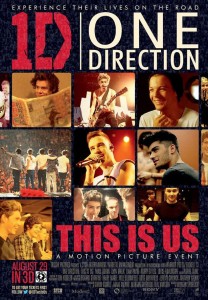To Remember 9/11/01 — Smithsonian’s 9/11: Strories in Fragments
Posted on September 11, 2013 at 7:00 am
Posted on September 11, 2013 at 7:00 am
Posted on August 30, 2013 at 8:00 am
Keanu Reeves — yes, Keanu Reeves — hosts a fascinating documentary about the impact of the switch from film to digital images in movies, tonight on PBS, and anyone who loves movies should take a look. For me, the revelation had nothing to do with the quality of the image, but the good and bad consequences of allowing a digital camera to run for hours without stopping, while film cartridges had to be changed several times an hour. Some actors, in some circumstances, love the chance to stay in the moment and keep trying new variations on the performance. Some directors keep the camera going and wear the actors out. As film begins to disappear in movies the way it has in still cameras, this thoughtful and insightful documentary illuminates what that means.
http://www.youtube.com/watch?v=cd4bKgFystQ
Posted on August 29, 2013 at 6:00 pm
 “They don’t know me, but they love me,” says one dewy-eyed One Direction fan, and that says it all.
“They don’t know me, but they love me,” says one dewy-eyed One Direction fan, and that says it all.
This 3D documentary and concert film gives us a peek at the moment in time when One Direction, a group of five British teenagers, reigned as the number one musical act in the world. As inevitable a part of early adolescence as cliques and braces is the transitional object known as the teen idol. Almost a hundred years ago, it was Rudolph Valentino. Then there was Frank Sinatra, the Beatles, the Monkees, Bobby Sherman, David Cassidy, Shaun Cassidy, the Backstreet Boys. The girls move on, but those ties are strong. Take a look at last Sunday’s Twitter feed when Justin Timberlake’s Video Vanguard performance included a reunion with N’Sync. While there have been notable individual teen idols, the boy band has the advantage of giving fans a range of options. All of them are always safely, well, let’s just say they don’t have to shave very often. There’s usually a cute one and a smart one and a (comparatively) rebellious one. So whole slumber parties can debate the merits of individual members but unite in their shared passion, and each girl can feel that she is expressing her sense of independence and still-evolving personal taste in her selection of a favorite. (I’m a Paul girl, myself.) Teen idols are a mostly harmless transition object for young girls as they rehearse some of their experience of attachment with someone who is safely far away.
After an “aw”-inducing introduction with some home movie footage of the five members of One Direction, as they tell us in voice overs about their early childhood (we’re talking seven to ten years ago in most cases) dreams of stardom. And then we see the Cinderella story of how they got started. They never met before they were contestants on the British talent competition show, “The X Factor.” They all lost competing as individuals. (Does anyone remember who beat them?) But then star-maker Simon Cowell saw something in the long line of runners-up. He pointed: you, you, you, you, you. He told them to get together and come back as a group. They laugh in recollecting that their first conversation was not about the music or the performance but about what they should wear.
What they had, in addition to nice, tuneful voices, was good attitudes and great chemistry. Over and over, they tell us how much fun they have with each other and how what keeps them going through all the work and pressure of the tour is that they’re in it with their best mates. They insist that they’re not like other boy bands because they’re “cooler.” Also, they are not good dancers and they don’t dress alike.
Morgan Spurlock (“Super Size Me,” “Pom Presents the Greatest Movie Ever Sold”) directed, so you might expect some exploration of the merchandising behind this “pre-fab five,” who seem like nice, talented kids, but who are the avatars of a marketing machine. When a fan says, “They say what we want to hear and no one says to us,” those of us outside of the fangirl demographic would like to know something about the genius who thought One Direction should sing about how it is not knowing she is beautiful is what makes a girl beautiful. We’d like to know more about how the age of social media make these boys stars before they had put out a single record. But this is not that movie. And it is certainly not Alun Owen’s/Richard Lester’s “Hard Day’s Night,” a masterpiece completely separate from the charm and hooky tunes of the Beatles in its innovative structure and documentary-like intimacy. This is just a love letter to the fans from five boys who know how lucky they are and like to show off for the camera.
Parents should know that the movie includes some strong language, some underwear shots, and brief potty humor, but is about as squeaky clean as any documentary about teenaged boys could be.
Family discussion: Which one do you like best and why? What makes them get along so well?
If you like this, try: “Bye Bye Birdie,” an affectionate satire of the teen idol phenomenon
Posted on July 26, 2013 at 5:14 pm
Mick Jagger turns 70 today! Happy birthday Mick — celebrate him by viewing two of this summer’s best documentaries, “Muscle Schoals” and “20 Feet from Stardom,” or some of these other great screen appearances:
Gimme Shelter The third in the rock concert trilogy that documented the late 1960’s journey from the innocence of “Monterey Pop” to the hope of “Woodstock” and then the Altamont, where a disastrous decision to have the Hells Angels provide security at a free Rolling Stones concert led to tragedy.
Ned Kelly: The True Story Of Australia’s Most Legendary Outlaw. Jagger plays the title character, the real-life Australian outlaw (also played by Heath Ledger in a later film).
Performance This trippy, non-linear crime drama was directed by Nicholas Roeg.
Shine a Light Martin Scorsese directed this documentary with sensational concert footage.
The Rolling Stones: Crossfire Hurricane Covering half a century of the Rolling Stones, this documentary has current interviews and archival footage to make it the definitive history — so far.
And I love this SNL skit with Jagger doing karaoke!
http://www.youtube.com/watch?v=0osV7A3C5VU
Posted on July 6, 2013 at 3:28 pm
 Kevin Hart’s new stand-up movie is short (about 75 minutes). And, as he will repeatedly remind you, so is he.
Kevin Hart’s new stand-up movie is short (about 75 minutes). And, as he will repeatedly remind you, so is he.
There’s a brief prologue where guests at a rooftop party accuse him of not being in touch with his father, having sex only with light-skinned women, and both being only locally famous and being so successful that he is no longer real. Furious, he tells his manager to get him to the Garden immediately. “The Olive Garden?” the man responds. No, Madison Square Garden! Kevin Hart has some things he wants to get off his chest. Let him explain!
Like all great stand-up comics, Hart is a master of timing and can make all of the roles in a story with a slight but astonishingly vivid shift in his face, voice, and posture. Like Dane Cook and Tyler Perry, Hart is a master of viral marketing and branding. Under the radar of the Hollywood machine, he has become the top touring stand-up, as he takes pains to show us with a global montage of venues, many enormous and all sold out. He may be able to stand on a street corner and plaintively explain that no one there seems to know who he is. But his millions of YouTube followers are devoted fans, and when he shows up, whether it’s London, Amsterdam, or Oslo, they are there.
And then it’s New York, and the Garden. He is excited to be there, and he brings the fire. Literally. He thought it was cool when Jay-Z and Kanye had fire on stage, so he gets some big fire and has it flame on every now and then to punctuate a punch-line — or just to be a punch-line, as we enjoy his enjoyment of the pretentiousness and pointlessness (but coolness) of fire on stage.
Stand-up is the toughest job in the performing arts. It’s you and the microphone. No script, no other performer to cue or toss to, no hit song to get the audience applauding after just one chord. It’s 30,000 people and you and your stories.
In this case, the stories are mainly in the “b****es be crazy” category. He begins by telling us he is happily divorced, which is great because he can do things like feed the pigeons without anyone suspecting he is a liar. Then he tells us he is a liar, but seems to think it is irrational for a woman to find that upsetting. Women, on the other hand, are not under any circumstances allowed to cheat. And friends — they are there to back you up, and when you begin the phone call with “Don’t lie,” that means, well: “LIE.”
Unlike the all-time greats, Chris Rock, George Carlin, and even Bill Cosby, Hart never goes past the “funny thing happened to me” line of comedy, which is entertaining enough, in large part because he sees his flaws. But you get the sense, especially in story about his son and a final comment about how much it means to him to be there, that there’s more to him. Now that he’s explained, maybe the next tour can be, “No Longer Safe.”
Parents should know that this movie is filled with profanity, n-words, and crude sexual references.
Family discussion: How do Hart’s expectations for the women in his life differ from what he expects from himself? Did he make the right decision in the story about his son? What do we learn about him from the opening scene?
If you like this, try: Hart’s “Laugh at My Pain” and the stand-up comedy of Chris Rock and Richard Pryor